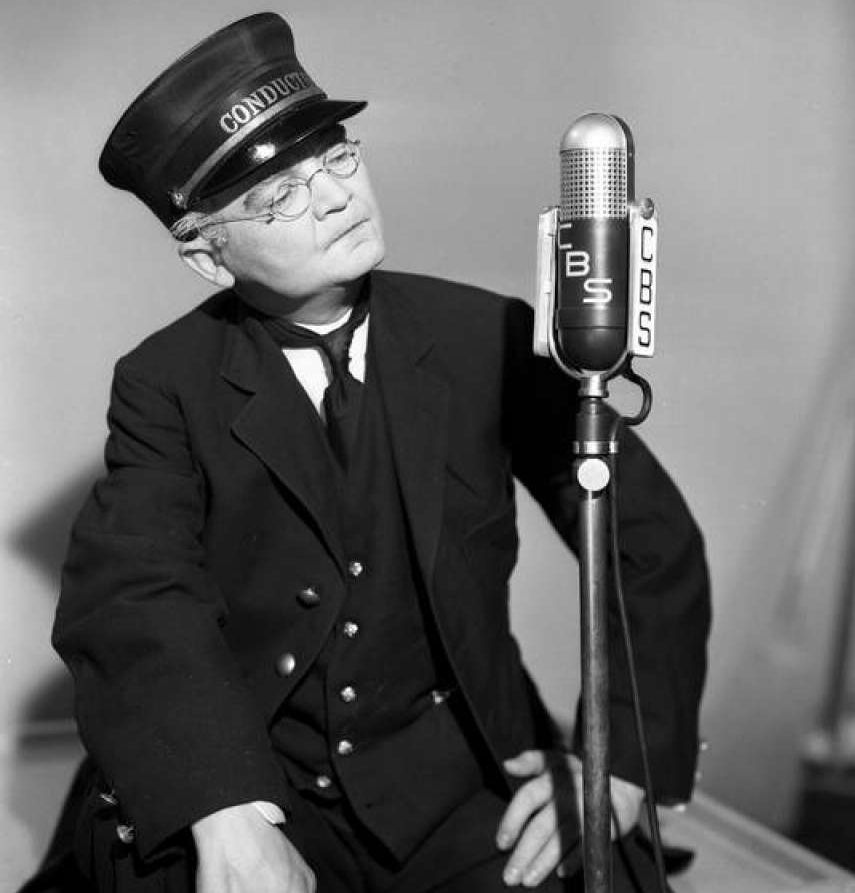Happy Birthday, Francis “Dink” Trout!
In the Golden Age of Radio, actors were often called upon to play “meek” individuals—or whatever nickname you prefer: wimp, nebbish, milquetoast, etc. The gold standard for these portrayals might be Bill Thompson, who even utilized “wimp” in the name of his famous creation “Wallace Wimple.” But the go-to thespian continually called upon to play any number of henpecked “Yes, dear” souls would unquestionably be “Dink” Trout, born Francis Harry Traut in Beardstown, Illinois on this date in 1898. A multi-talented performer described by author Trav S.D. (author of No Applause—Just Throw Money) as “a fascinating jack of all trades” (musician, radio personality, screen actor, voice-over artist), Trout is fondly remembered by old-time radio fans for bringing life to two unforgettable characters on the sitcoms A Day in the Life of Dennis Day and The Life of Riley.
 The son of a civil engineer (Frank J. Traut), Dink Trout attended the University of Illinois and, upon graduation, began to pursue an acting career with vigor. In 1926, he appeared in a Broadway production of The Wild Rose as a character named “Zeppo.” Trout worked briefly for “The Old Maestro,” Ben Bernie, playing marimba and trombone in his orchestra. His gig with Bernie led to radio work, with Dink headlining his own radio show over WOR in 1927. Trout also made the rounds on the vaudeville circuit and played in any number of Chautauqua shows.
The son of a civil engineer (Frank J. Traut), Dink Trout attended the University of Illinois and, upon graduation, began to pursue an acting career with vigor. In 1926, he appeared in a Broadway production of The Wild Rose as a character named “Zeppo.” Trout worked briefly for “The Old Maestro,” Ben Bernie, playing marimba and trombone in his orchestra. His gig with Bernie led to radio work, with Dink headlining his own radio show over WOR in 1927. Trout also made the rounds on the vaudeville circuit and played in any number of Chautauqua shows.
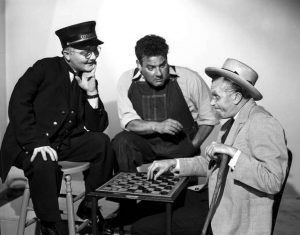 One of Dink Trout’s first high-profile radio jobs was as a regular on Scattergood Baines, a daily serial that premiered over CBS’ West Coast on February 22, 1937. The show was based on a creation by author Clarence Buddington Kelland (best-known for a short story, “Opera Hat,” that became the basis of the classic 1936 comedy Mr. Deeds Goes to Town). The main character was a wise country sage who dispensed wisdom and advice in a small Vermont town. Trout portrayed Pliny Pickett, the conductor of the town’s branch-line train, and one of Scattergood’s true-blue pals. Scattergood Baines moved to the full coast-to-coast CBS network in October of 1938 and, apart from a four-month hiatus in 1941, was a Tiffany mainstay until June 12, 1942. While Baines was still enjoying its radio run, independent film producer Jerrold T. Brandt instituted a B-movie franchise at R-K-O that allowed Dink to reprise his radio role (veteran character actor Guy Kibbee was the “name” enlisted to portray Scattergood) in three of the six programmers that comprised the series: Scattergood Baines (1941), Scattergood Baines Pulls the Strings (1941), and Cinderella Swings It (1943), the final entry.
One of Dink Trout’s first high-profile radio jobs was as a regular on Scattergood Baines, a daily serial that premiered over CBS’ West Coast on February 22, 1937. The show was based on a creation by author Clarence Buddington Kelland (best-known for a short story, “Opera Hat,” that became the basis of the classic 1936 comedy Mr. Deeds Goes to Town). The main character was a wise country sage who dispensed wisdom and advice in a small Vermont town. Trout portrayed Pliny Pickett, the conductor of the town’s branch-line train, and one of Scattergood’s true-blue pals. Scattergood Baines moved to the full coast-to-coast CBS network in October of 1938 and, apart from a four-month hiatus in 1941, was a Tiffany mainstay until June 12, 1942. While Baines was still enjoying its radio run, independent film producer Jerrold T. Brandt instituted a B-movie franchise at R-K-O that allowed Dink to reprise his radio role (veteran character actor Guy Kibbee was the “name” enlisted to portray Scattergood) in three of the six programmers that comprised the series: Scattergood Baines (1941), Scattergood Baines Pulls the Strings (1941), and Cinderella Swings It (1943), the final entry.
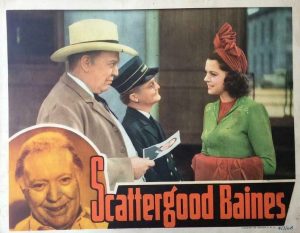 Dink Trout was no novice when it came to movie making: his initial debut was an uncredited appearance in 1936’s Under Your Spell, but he turns up in a number of OTR-themed films or alongside the radio star headliners. Trout has small roles in Gildersleeve’s Bad Day (1943) and It’s a Great Life (1943; part of the Blondie series), and worked alongside Danny Kaye in Up in Arms (1944) and Jack Benny in his notorious The Horn Blows at Midnight (1945). Dink’s other film roles include Miss Polly (1941), The Doughgirls (1944), I’m from Arkansas (1944), When Irish Eyes are Smiling (1944), Sudan (1945), and Notorious (1946). Toward the end of the decade, Trout was punching a time clock for Disney in the form of a small role in So Dear to My Heart (1948) and voicing the character of Bootle Beetle in several Donald Duck cartoons.
Dink Trout was no novice when it came to movie making: his initial debut was an uncredited appearance in 1936’s Under Your Spell, but he turns up in a number of OTR-themed films or alongside the radio star headliners. Trout has small roles in Gildersleeve’s Bad Day (1943) and It’s a Great Life (1943; part of the Blondie series), and worked alongside Danny Kaye in Up in Arms (1944) and Jack Benny in his notorious The Horn Blows at Midnight (1945). Dink’s other film roles include Miss Polly (1941), The Doughgirls (1944), I’m from Arkansas (1944), When Irish Eyes are Smiling (1944), Sudan (1945), and Notorious (1946). Toward the end of the decade, Trout was punching a time clock for Disney in the form of a small role in So Dear to My Heart (1948) and voicing the character of Bootle Beetle in several Donald Duck cartoons.
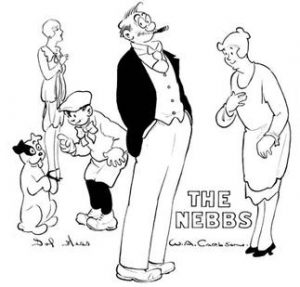 Dink Trout played “Roger Waddington” on The Adventures of Ozzie & Harriet and a meek little character who answered to “Horace” on The Fitch Bandwagon during Cass Daley’s season (1945-46) with the program. Trout essayed the role of “Obie Slider” on The Nebbs, a 1945-46 Mutual sitcom based on the popular comic strip created by Sol Hess and starring the husband-and-wife team of Kathleen and Gene Lockhart. When Lum & Abner adopted its weekly half-hour, live-audience format in 1948, Dink was pressed into playing lunchroom owner Luke Spears. Other radio shows on Trout’s resume include The Abbott & Costello Show, All-Star Western Theatre, The Baby Snooks Show, The Cavalcade of America, Command Performance, Family Theatre, Frontier Theatre, Johnny Madero, Pier 23, The Lux Radio Theatre, Meet Me at Parky’s, Our Miss Brooks, Screen Directors’ Playhouse, and The Sealtest Variety Theatre.
Dink Trout played “Roger Waddington” on The Adventures of Ozzie & Harriet and a meek little character who answered to “Horace” on The Fitch Bandwagon during Cass Daley’s season (1945-46) with the program. Trout essayed the role of “Obie Slider” on The Nebbs, a 1945-46 Mutual sitcom based on the popular comic strip created by Sol Hess and starring the husband-and-wife team of Kathleen and Gene Lockhart. When Lum & Abner adopted its weekly half-hour, live-audience format in 1948, Dink was pressed into playing lunchroom owner Luke Spears. Other radio shows on Trout’s resume include The Abbott & Costello Show, All-Star Western Theatre, The Baby Snooks Show, The Cavalcade of America, Command Performance, Family Theatre, Frontier Theatre, Johnny Madero, Pier 23, The Lux Radio Theatre, Meet Me at Parky’s, Our Miss Brooks, Screen Directors’ Playhouse, and The Sealtest Variety Theatre.
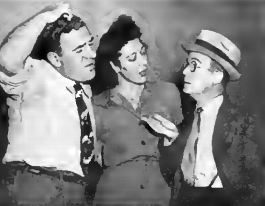 But when fans fondly reminisce about Francis “Dink” Trout, it’s a good bet that his characterization of “Waldo Binney” on The Life of Riley is near the top of the list. Waldo was a neighbor of Riley’s whose mild, docile demeanor provided a direct contrast to Chester’s bombastic pal Gillis. The fall of 1946 would provide Trout with his most inspired radio role. On A Day in the Life of Dennis Day, Dink was Herbert Anderson—the timid father of Dennis’ girlfriend Mildred. Mr. Anderson was a man who had been so beaten down by his domineering wife Clara (Bea Benaderet) that on the rare occasion when he stood up to her (he called her “Poopsie”) it was guaranteed to bring the house down. Herbert’s trademark was to laugh at something stupid uttered by his potential son-in-law (who had no shortage of idiotic observations) with a dismissive “Silly boy…”
But when fans fondly reminisce about Francis “Dink” Trout, it’s a good bet that his characterization of “Waldo Binney” on The Life of Riley is near the top of the list. Waldo was a neighbor of Riley’s whose mild, docile demeanor provided a direct contrast to Chester’s bombastic pal Gillis. The fall of 1946 would provide Trout with his most inspired radio role. On A Day in the Life of Dennis Day, Dink was Herbert Anderson—the timid father of Dennis’ girlfriend Mildred. Mr. Anderson was a man who had been so beaten down by his domineering wife Clara (Bea Benaderet) that on the rare occasion when he stood up to her (he called her “Poopsie”) it was guaranteed to bring the house down. Herbert’s trademark was to laugh at something stupid uttered by his potential son-in-law (who had no shortage of idiotic observations) with a dismissive “Silly boy…”
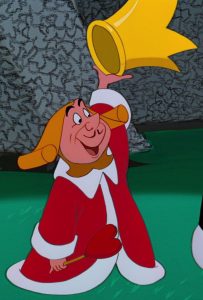 A brief item in the “Radio in Review” column of the March 3, 1950 edition of Radio-TV Life noted that Dink Trout and Barbara Eiler (who was playing Mildred on the Day show at the time) would not be returning to A Day in the Life of Dennis Day the following season. (This is accurate: a change in the show’s format found Dennis trying to make it on his own in Hollywood, with Benaderet playing a new landlady character.) In the case of Trout…this might have been a premonition. Dink went in for cancer surgery not long after the Radio-TV Life announcement and complications from two procedures during his three-week stay took his life at age 51. His final role wouldn’t be released until the following year when he provided the memorable voice of the King of Hearts in the Walt Disney production of Alice in Wonderland (1951).
A brief item in the “Radio in Review” column of the March 3, 1950 edition of Radio-TV Life noted that Dink Trout and Barbara Eiler (who was playing Mildred on the Day show at the time) would not be returning to A Day in the Life of Dennis Day the following season. (This is accurate: a change in the show’s format found Dennis trying to make it on his own in Hollywood, with Benaderet playing a new landlady character.) In the case of Trout…this might have been a premonition. Dink went in for cancer surgery not long after the Radio-TV Life announcement and complications from two procedures during his three-week stay took his life at age 51. His final role wouldn’t be released until the following year when he provided the memorable voice of the King of Hearts in the Walt Disney production of Alice in Wonderland (1951).
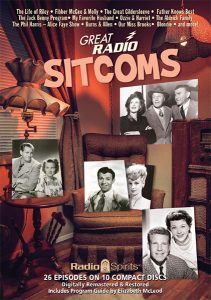 A July 1948 edition of Radio Mirror features a lengthy article on Dennis Day and his wife Peggy…and a passing reference to our birthday boy. Did you know that Dennis owned a Cocker Spaniel…that answered to “Dink Trout”? Well, Radio Spirits features some of the funniest half-hours of Day’s 1946-51 sitcom in our A Day in the Life of Dennis Day collection, and you can also hear Dink on The Life of Riley sets Blue Collar Blues and Magnificent Mug. Check out Dink on Great Radio Comedy and Great Radio Sitcoms, too!
A July 1948 edition of Radio Mirror features a lengthy article on Dennis Day and his wife Peggy…and a passing reference to our birthday boy. Did you know that Dennis owned a Cocker Spaniel…that answered to “Dink Trout”? Well, Radio Spirits features some of the funniest half-hours of Day’s 1946-51 sitcom in our A Day in the Life of Dennis Day collection, and you can also hear Dink on The Life of Riley sets Blue Collar Blues and Magnificent Mug. Check out Dink on Great Radio Comedy and Great Radio Sitcoms, too!

